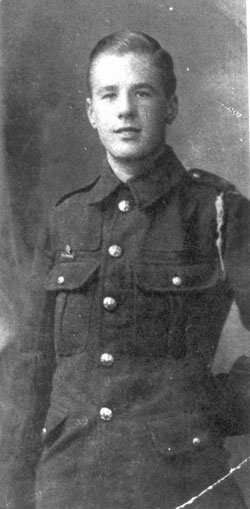your family stories
World War I
Imperial Army Soldier
James (Jim) Verner Waddell
Unanswered Questions
 James (Jim) Verner Waddell. Uniform of Army Cyclist Corps? Photo dated 1915.
James (Jim) Verner Waddell. Uniform of Army Cyclist Corps? Photo dated 1915.During World War I Jim Waddell served in the 11th Army Cyclist Corp and Military Foot Police until the armistice and afterwards with Captain Robert N. Thompson in Namur, Belgium until August 1919. After the war, in 1921, he came to Montreal, Canada and eventually married and settled in the Montreal area.
Questions
Jim (JV) Waddell's official World War I record was one of many that were lost in a fire caused by bombing in World War II. What we know is put together from his stories and memorabilia and the official World War I medal card and medal roll from the National Archives UK.
There are many questions which I would like to have the answers to, but lacking official documentation may never be answered.
For example:
Where did he enlist in World War I?
Who did he enlist with?
Where and when was he injured?
Why do we have photos of him in uniform, 1915, 1916 if his Medal Roll entry shows his service from March 3, 1917? Were the photos taken on his first enlistment? Does the medal card only show his service once he got to a theatre of war?
Enlisting in World War I
 James (Jim) Verner Waddell seated with another
soldier standing, believed to be his brother,
Archibald Wotherspoon Waddell.
James (Jim) Verner Waddell seated with another
soldier standing, believed to be his brother,
Archibald Wotherspoon Waddell.The parts of the story told below in italics were written by his younger son, Keith, in 1991.
"At 15 Jim joined up. An uncle learned of it, told his father and Jim was released, but within a year he tried again. Men were needed but boys would do – and he stayed in the army."
"Perhaps he joined up for the adventure, to fight for the right cause, or to support the underdogs in Europe that the Germans were overrunning. Any of these reasons could have been his motive. Somewhere he had learned that one had to fight for what was right. In later years we noticed that he did not mind speaking out for the underdog – and he had little patience for B.S., being the type who called a spade a spade!"
World War I Experiences
Wounded
"Whatever his reasons, Jim joined up to fight the Germans – and did so. He was wounded by shrapnel at some point, recuperated and returned to the front, but he walked with an uneven gait for the rest of his life and frequently had a sore back."
Learning German from POW's
Presumably while a Military Foot Police in World War I, Jim Waddell drew duty guarding P.O.W.'s and learned to speak German quite adequately. His daughter remembers learning to say "Nehmen Sie Ihre Hände aus Ihren Taschen", which means, "Take your hands out of your pockets". Apparently a useful expression while working with P.O.W.'s!
"His knowledge of German was a source of pride and a means to welcome others who must have been particularly vulnerable here in North America between the wars and after World War II. Strange that he later found it almost impossible to learn French."
(although he claimed the ability to speak it on arriving in Canada).
"Perhaps his Scottish accent, which he never completely lost, had been an asset to learning German, while a handicap to French." (Nonetheless, he wasn't shy to use it . We have a recording of him telling a joke in French.)
Sentry Duty near Menin Gate, October 1917
Another job Jim Waddell had during World War I was sentry duty. He used to tell an amusing story about an encounter he had one night. Three written copies of this story exist, having been submitted to "The Saturday Evening Post" in 1949, "BBC Television" in 1964, and The Reader's Digest, "Humour in Uniform".
His daughter summarizes this story:
While standing sentry duty one cold and rainy night as the transport of munitions went on using mules, Dad reported meeting the most bedraggled, muddy pair of mule and mule skinner. The leader stopped in the muddy road in front of Dad’s post to roll a cigarette. The mule, obviously glad to interrupt its plodding, stopped with its nose close to the mud. The soldier, looked over at the sentry and with a straight face, asked: “’ave you seen the ‘ounds pass this way?" This facetious remark caused Dad to chuckle for the rest of his shift – and was shared after with others in his unit.
Three written versions of this story exist written by Jim.
World War I Medal Card
Jim Waddell's medal card shows his regimental numbers for both the Army Cyclist Corps and the Military Foot Police (M.F.P.):
| Name: J. Waddle Waddell (name change 9M) | ||
|---|---|---|
| Corps | Rank | Regtl. No. |
| A.C.C. | Pte | 17384 |
| M.F.P. | P/14768 | |
World War I - Jim Waddell - Medal Roll
Then, looking at the Military Foot Police Regiment or Corps listing in the Medal Roll for World War I, page 1051, Jim Waddell's record shows:
Regtl. No. |
Rank |
Name |
Intitial |
Units and Corps served in |
Theatres of War served in: 1 |
Remarks |
|
| P14763 | unclear | WADDELL | J. | 17384 Pte 11th A. Cyc. Corps | 17-03-17 | 11-11-18 | * auth MFP/101 B7 (2) |
| P14765 MFP | |||||||


















